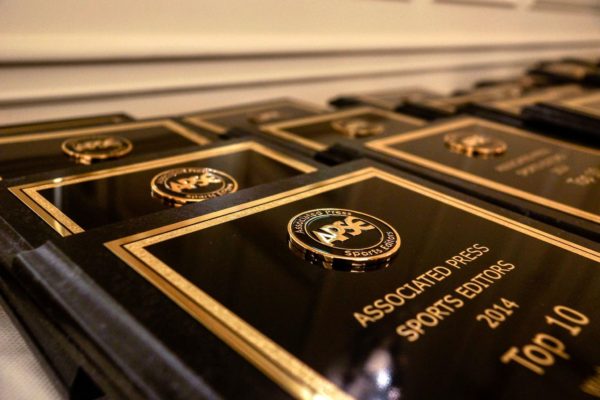 |
With his colorful prose and trousers to match, Bud Collins has become synonymous with professional tennis. Now that he is the 1999 recipient of the Red Smith Award, Collins is synonymous with excellence in sports journalism.
"It’s probably the biggest honor I’ve had," said Collins, the Boston Globe correspondent and NBC commentator who is scheduled to receive the award June 24 at the convention’s Red Smith Award luncheon in Phoenix. "I was very pleased. To be voted for something by your peers is always an honor.
"I knew Red slightly but admired him mightily. Jim Murray was a friend. I think I know all the [Red Smith winners] but one. I consider many of them friends. It’s a nice cast to be part of, and I’m glad to be a walk-on."
Collins led the way for print journalists to showcase their talents as broadcasters when he left the Globe as a full-time employee in 1974. The Red Smith Award recognizes writers and editors who have made major contributions to sports journalism and is voted on by APSE’s former presidents.
APSE established the award in 1981 and named Smith, a columnist for the New York Times at the time but probably better known for his long service with the New York Herald-Tribune, as the first winner. Besides Smith, Collins joins Pulitzer Prize winners Murray and Dave Anderson, among others.
"This award recognizes a brilliant career in which Bud’s wit, creativity and intelligence served his readers well," said Matthew V. Storin, editor of the Globe. "He probably did more than any other writer to bring professional tennis to the height of its popularity."
Collins’ writing has appeared in the Globe since 1963. He has covered everything from the Red Sox to the British Open to the Olympics. He cited his coverage of the Vietnam War and Muhammad Ali’s career as points of pride. During his few months of war coverage in Vietnam, Collins went on patrol with the Marines and on a bombing mission with the Air Force.
From 1961 to 1974, he covered Ali, at one point traveling on Ali’s bus from Miami to Chicopee, Mass., where Ali trained for the second Sonny Liston fight in Lewiston, Maine. Collins remembered his time with Ali as "lots of good laughs, lots of good fun, lots to write about."
Collins also fondly recalled a trip to Johannesburg, where he followed Arthur Ashe in Ashe’s effort to integrate the South African Open in 1973.
"This is a tremendous honor, and one Bud richly deserves," said Don Skwar, the Globe’s assistant managing editor for sports. "Bud is Mr. Tennis. He’s known all over the world as the preeminent writer and voice of the game. When it comes to his body of work over the last 30-plus years, there’s only one way to put it: Advantage, Collins."
Raised in Ohio, Collins got an early start in the newspaper business. He advanced from delivering the Cleveland Plain Dealer to sports editor of his weekly hometown newspaper, the Berea Enterprise. From 1945 to 1949, he covered such things as the county fair and donkey baseball for $5 a week. Collins was responsible for filling the paper’s eight-column sports page, laying out the section and writing headlines.
Between the Berea Enterprise and a job with the Boston Herald, Collins served in the Army and as a college sports information director. While a student at Boston University, he was a copy boy at the Herald. Collins wrote for the Herald from 1955 to 1963, then moved to the Globe.
In 1994 he was inducted into the International Tennis Hall of Fame.
Through his writing and television work, Collins has become a respected figure in the tennis community. The top players — past and present — are never more than a phone call away. After a day of matches last year at Longwood, fans lined up for a copy of his new book, The Bud Collins Tennis Encyclopedia, and a few words with him.
Collins makes the game fun with his playful nicknames and witty commentary. He brought us Chris America for Chris Evert, Fraulein Forehand for Steffi Graf, and, most recently, Sisters Sledgehammer for Venus and Serena Williams.
"I feel lucky to do both [television and newspapers]," Collins said. "[Covering sports] beats working for a living."





